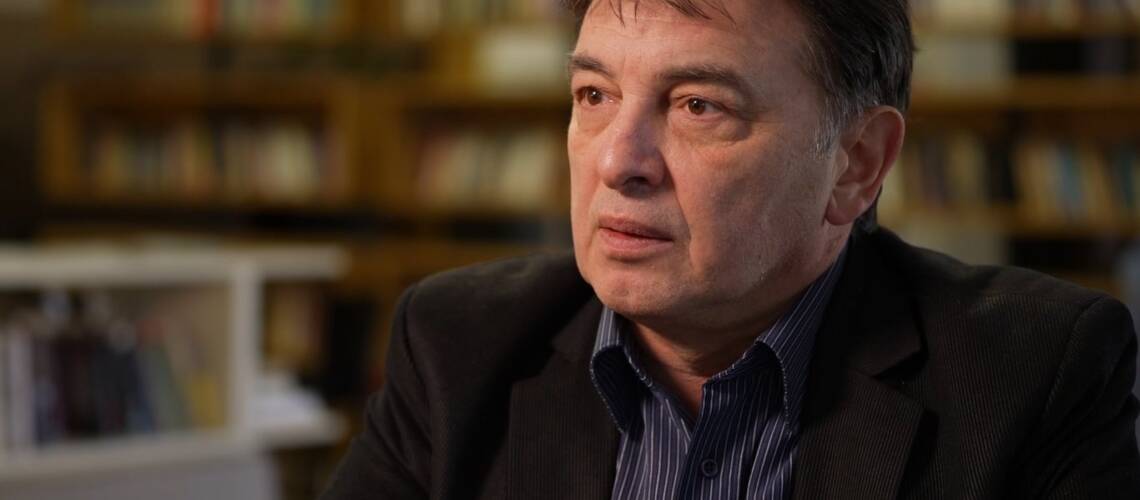Medical care and civilization mark their simultaneous emergence with the discovery of an artifact from prehistoric times, representing a broken and healed femur. Medicine as a science has a thousand-year history, while less than two centuries separate us from the birth of genetics. Today it is a major source of information, thanks to which therapeutic solutions are found for until recently incurable diseases – hereditary and acquired. Apart from its prognostic nature, genetics has an increasing role in early diagnosis and understanding of disease etiology.
Non-benign lung carcinoma is the most common malignancy of the lung. Family burden is a factor with a high percentage risk for carrier and manifestation of the disease. What is the role of biomarkers and genetic testing, can they serve in the therapy and prevention of lung cancer, says Prof. Dr. Alexey Savov, director of the National Genetics Laboratory.
Prof.. Savov, what is the role of family burden in patients with lung cancer?
When we talk about familial carcinomas, This means, that lung cancer is not specifically caused by environmental factors (smoking, exposure to aggressive substances, etc.), and is caused by mutations in specific genes, which lead to an increased risk of developing cancer. Usually, this genetic base is shared by other members of the family. Our direct observations confirm this. When there is such a family burden, 70-80% of the patients were born with a single gene mutation, whose role is to suppress the development of tumor tissues. In these people, the risk of cancer is very high.
How much exactly?
We can hardly say for sure, because it depends on additional factors. However, if the family is burdened, they can reach up to 80%.
Can genetic testing for heredity be helpful in such a case?
It is good to consider in which cases to offer such a study, because it must be preceded by adequate consultation, of a person's attitude to undergo genetic testing, to accept the information, whatever she is, and to listen to prevention advice. It is recommended that everyone stop smoking cigarettes, but in people with a family history of lung cancer, this bad habit would very likely unlock the unwanted consequences.
Gene panel studies exist in medical practice. If a carrier of a certain genetic defect or impaired function is found, an indication can be given, that a certain type of carcinoma could be unlocked over time. But we have to look at the other side as well: if one understands, that it carries such a mutation, this can stress him out. And we cannot determine the percentage risk for the occurrence of the oncological disease with absolute accuracy, because there are other factors, which cannot be measured and evaluated – the way of life, cultural conditions, etc. That's why we say, that risk varies between 20% and 40%. And if another gene is also affected, which concerns the regulation of the organism, this percentage is naturally increasing.
It should be considered, that some mutations have arisen and are passed down over generations, even millennia. And here the role of the specialist, which reads the results of genetic tests, is very important. If such a genetic study, which basically has a prognostic character, not be well explained, it can do more harm than good, because it leads to mental strain and confusion of the person. He begins to question himself: Whether and when the disease will manifest itself? If it comes to the family burden, whether the mutation will not be passed on to the next generation? With the means of modern medicine, can this transmission be limited through pre-implantation diagnostics?, through embryo selection, who do not carry the high-risk alleles, etc. You understand, that the result of this research would change the whole attitude and life of the person, and disease may never appear anyway.
If we talk about genetic research not as a prediction, and as diagnosis of the disease and refinement of therapeutic solutions, lung cancer is the third most common in our country. 85% of cases were due to non-small cell lung carcinoma, and nearly half of these patients have a certain type of genetic mutation. Why the determination of the mutation, caused the disease, is key to treatment? What are biomarkers??
Different types of cancer cells have different profiles, something in their program is different. And the program is genetics. That is, each different cancer is a malfunction in the genetics of different genes, and genetic research serves us, to understand their specifics. When there is tumor tissue, taken from a biopsy, genetic profiling is done – not just one gene is examined, but many genes, that we know of, that they are related to the regulation and would lead to the so-called. malignancy of the normal cell. Our job is to find out exactly what and in which gene the damage happened. That explains the problem for us. It's like finding an unguarded door in a cancer fortress. That's how you find his weak point. And we actually find that, when we study genetically the different types of tumor tissues and every single change in them (different DNA, protein or molecule) brings information to us. We call her “biomarker”. It is different for the tumor cell and the normal cell.
The next step is to understand the information about this marker if it can serve us to attack the tumor tissue like this, to hurt only her, rather than normal cells. That's the idea of biomarkers, regardless of whether we see and study them at the level of proteins, RNA or genes.
Any “an unprotected door” can be attacked?
In one tumor tissue, we find many breakthroughs, but not for everyone we currently have “arsenal” to attack. I'll give you an example: abnormal biomarker levels “epithelial growth factor in non-small cell lung carcinoma” do not exclude the presence of other mutations in the sample, which we have taken for research. But in terms of the mutation in that biomarker, we have a therapeutic way to attack and block. Therefore, when biopsy material is taken, it is much better to examine the tissue as widely as possible, because if today we still don't have a solution for some mutations, literally tomorrow or in two days there may be one. In our practice, this happens all the time.
Sounds pretty encouraging, but what should the Bulgarian patient do?, diagnosed with lung cancer? Where should he go, to explore his biomarkers and who should refer him?
The patient's path should be as follows: after going through all the specialists – oncologists, pathologists, imaging and be diagnosed, to take biological material, to be examined in a specialized laboratory, and the result of the genetic test to come back to him.
That is, you cannot in this case give a direct recommendation or consultation to the patient, related to diagnosis and treatment.
Exactly. The patient and I have no business, and with its material, as we define a profile, which is nomenclatural, valid anywhere in the world and according to the variant, which we discover, only an oncologist can determine the therapy.
How many lung cancer patients have passed through your laboratory for 2022 g.? Do you notice an increasing trend?
On an annual basis, our laboratory carries out genetic profiling of approx 300-400 the patient with this diagnosis. How is it in the other labs, whether all patients are referred, all these unknowns do not allow for firm conclusions to be drawn.
The trend towards an increase in lung cancer comes more from the risk factors. Bulgaria continues to be one of the leading countries in the world in terms of smoking. This generates the main risk for the occurrence of non-small cell lung cancer. Social status should be taken into account, economic indicators, the proportions of minority groups, their cultural habits, prevention, prevention… All of these are relevant to trendsetting.
And would you recommend that healthy people with a family history of lung cancer get their genes tested?
Categorically! But before that, it is good that these people first get an adequate consultation from a specialist in oncogenetics, to explain to them what the test consists of, what to expect and then interpret it, as there are certain criteria and principles. Hypothetically, every person could encounter some type of carcinoma. The issue with family cases of oncological diseases is more delicate. Although familial cases of lung cancer are not so common. Family mutations are not absolute doom for a person, that he will surely develop carcinoma, but the risk is quite high. It depends on the type of mutation, of type gen, generally from genetics. That's why, when we encounter familiarity, we would strongly recommend that people consider what their risk is and we might suggest testing for multiple genes, which may cause the development of carcinoma. The results can be divided into two groups. In the first, we find no change in the genes, which means, that most likely this individual does not carry the familial defect. In the second option, let's find out, that a person carries such a defect. It is quite stressful, but not necessarily a sign, that this person will get cancer. Rather, it is a motive, an argument to direct him to prevention and to limiting the risk of encountering such diseases. It would be more correct, when we examine an already diagnosed patient and find a genetic defect, then let's examine his relatives as well. Genetic results are delicate. We've had people, who have been stressed to the point of illness or to the shock of a result, which represents a harmless carrying of something, which will never be a problem for them, as well as cases, in which such a genetic result diagnoses the individual with a disease, but he has no idea which specialist to turn to…
What is the future of genetics in lung cancer??
As I already mentioned, the better a tumor tissue is profiled, the more places open up, on which it can be attacked. However, I am betting in the future on the possibility of the earliest diagnosis. Incidence and appearance of lung cancer are specific according to gender and other circumstances, but manifest themselves at a more mature age. Similar to the principle of monitoring blood pressure and blood sugar with a glucometer, I wish there were small devices like this, which over time profile biomarkers. Then we will be able to start single cell therapy, and not when there is already formed tumor tissue. Of course, however, before that, the clinically relevant cutoff must be refined.
Business card
Prof.. Dr. Alexey Savov is the head of the National Genetics Laboratory.
He graduated from the Faculty of Biology of the SU “St. Kliment Ohridski” with profile “Molecular biology” and major “Genetics” through 1989 r. He has a master's degree in bacterial genetics and a medical specialty in medical biology from 2006 r.
He received a doctorate degree in 1997 r. with the dissertation on a topic “Molecular characteristics of cystic fibrosis in Bulgaria”.
There are additional qualification courses and specializations in Italy and France.
He has been a long-time teacher at the Medical University in Sofia, as well as in SU “St. Kliment Ohridski”. Lecturer in training courses of the Bulgarian Association for Ultrasound in Obstetrics and Gynecology and the Bulgarian Association for Ultrasound in Medicine. He has attended numerous congresses, conferences and scientific forums, as well as participation in scientific projects and expert groups, publications of author's editions and in scientific collections and magazines.









